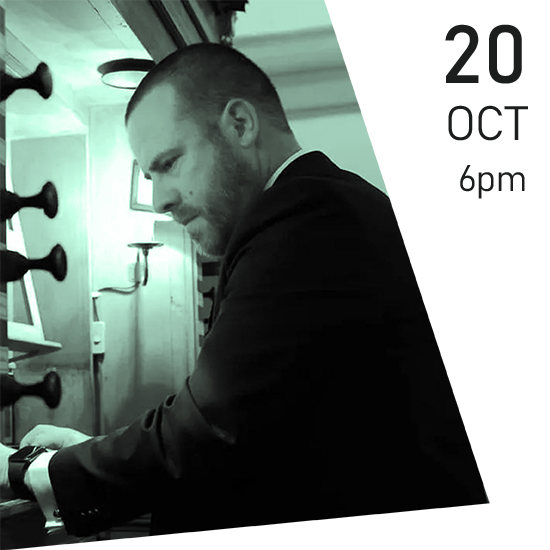 October 20, Sunday, 6.00 pm
October 20, Sunday, 6.00 pm
Igreja de Nossa Senhora da Luz, Ponta do Sol
Sérgio Silva, organ
Mariana Moldão, soprano
For centuries, the art of improvisation has been a fundamental practice in the organ universe, which could include the immediate creation of music in a free form or in a specific musical genre, the on-site harmonisation of melodies, the creation of figured bass, as well as the embellishment of the existing repertoire to the changing taste of the performer, both in liturgical and profane contexts. In parallel, musical writing can reveal improvisational practices of its time and place.
Salve Regina is the Catholic Church’s Marian antiphon for the current liturgical time. Its solemn form, probably dating from the eleventh century, serves as a motto for the introduction of improvisation in the present program, followed by the Obra by Pedro de Araújo, based on the same antiphon, in which one can improvise to embellish the text, a common practice at the time. through the introduction of glosas, ornamentation and musica ficta (a conventional process of chromatic alteration of the text to the performer’s taste).
In the profane context, the act of improvising would be associated with adaptations and arrangements of songs, such as the famous Belle qui tiens ma vie by Thoinot Arbeau and Susanne un jour, a poem by Guillaume Guéroult with music by Didier Lupi Second. In the instrumental versions by Cabezón and Merulo, it is possible to identify improvisational practices in the musical text, with their movements of cascades, tirate, glosas and diminutions throughout several bass and treble solos. In the presentation of the melody of Susanne un jour, a free harmonisation, in the language of the period, is proposed.
The Portuguese composer Manuel Rodrigues Coelho, left us a precious legacy of the musical traditions of his time, specifically on the practice of alternatim, then quite common in the Catholic liturgy. Designed to alternate with the odd-numbered plainchant verses of the Magnificat primi toni, Coelho’s four even-numbered verses, will be complemented with two improvised verses on the organ to complete the Magnificat.
Carlos Seixas is par excellence the Portuguese composer of the sonata in binary form, typical of the southern Baroque. Composed of three movements, the Sonata in g minor implies the repeats in each section, in which it is common to introduce ornaments and figurations in an improvised way.
In the works of Carissimi, Rodrigues Esteves and Monteverdi, written for soprano and basso continuo, improvisatory practices in the performance of figured bass from different schools and periods can be observed. Carissimi, a representative composer of the Roman school, composed Salve, salve, puellule for the Christmas season, as a joyful song welcoming the infant Jesus. Rodrigues Esteves, a descendant of the same school and a composer representing the process of Italianisation of music in Portugal, composed a version of the Stabat Mater sequence, a poem that illustrates Mary’s suffering by the Cross. Monteverdi’s motet Jubilet tota civitas presents two dialoging characters in a soprano solo (one who invites everyone to rejoice in the city and another who asks for the reason for the occasion), being preceded by an improvised prelude in the form of a toccata – intonazione – with the aim of introducing the harmonic context.
— SÉRGIO SILVA —
Programme
Gregorian Chant
¬ Salve Regina (tonus solemnis)
Pedro de Araújo (fl.1663-1705)
¬ Obra de 1º tom sobre a Salve Regina *
Thoinot Arbeau (1520-1595)
¬ Belle qui tiens ma vie
Antonio de Cabezón (1510-1566)
¬ Diferencias sobre «La Dama le demanda» *
Manuel Rodrigues Coelho (c.1555-1635)
¬ Versos de primeiro tom pera se cantarem ao orgão (verses 2, 4, 6, 8) alternated with
Gregorian Chant
¬ Magnificat primi toni (odd verses)
and
Sérgio Silva (1981)
¬ Improvisation (verses 10, 12) *
Didier Lupi Second (fl. 16th c.)
¬ Susanne un jour
Claudio Merulo (1533-1604)
¬ Susanne un jour *
Giacomo Carissimi (1605-1674)
¬ Salve, salve puellule
Carlos Seixas (1704-1742)
¬ Sonata in g minor *
› Allegro
› Giga
› Minuet
João Rodrigues Esteves (1701?-1752)
¬ Stabat Mater
› Eja, Mater
› Fac me vere
Sérgio Silva
¬ Improvisation in stile intonazione *
Claudio Monteverdi (1583-1643)
¬ Jubilet tota civitas, SV 286
* solo organ
